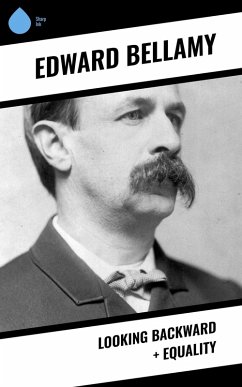
Edward Bellamy: Collected Works (eBook, ePUB)
Science Fiction Classics, Utopian Novels & Short Stories
Versandkostenfrei!
Sofort per Download lieferbar
2,13 €
inkl. MwSt.
Weitere Ausgaben:

PAYBACK Punkte
0 °P sammeln!
Edward Bellamy: Collected Works presents a captivating anthology of essays, novels, and critiques that explore Bellamy's vision of a future utopia, characterized by socio-economic reform and technological advancement. This compilation includes his most famous work, "Looking Backward," which critiques the inequalities of 19th-century capitalism and envisions a peaceful, cooperative society thriving in the year 2000. Bellamy's literary style, characterized by clear, incisive prose and an engaging narrative voice, creates a bridge between fiction and social critique, making his works both accessi...
Edward Bellamy: Collected Works presents a captivating anthology of essays, novels, and critiques that explore Bellamy's vision of a future utopia, characterized by socio-economic reform and technological advancement. This compilation includes his most famous work, "Looking Backward," which critiques the inequalities of 19th-century capitalism and envisions a peaceful, cooperative society thriving in the year 2000. Bellamy's literary style, characterized by clear, incisive prose and an engaging narrative voice, creates a bridge between fiction and social critique, making his works both accessible and profound. Contextually, Bellamy's writings emerged during the rise of the Progressive Era, reflecting contemporary anxieties about class divisions and economic injustice. Edward Bellamy (1850-1898) was an American writer and social activist whose experiences as a journalist and his immersion in socialist thought shaped his narrative around societal reform. Raised in a middle-class family, Bellamy's early exposure to the struggles of the working class fueled his desire for change, motivating him to envision a just society where technology liberates rather than oppresses. His profound insights into economic systems and human rights were pioneering, inspiring movements and discussions about socialism that persist today. This collection is recommended for readers seeking not only a glimpse into Bellamy's imaginative world but also a deeper understanding of the socio-political issues of his time. Academic scholars, social activists, and general readers alike will find relevance in Bellamy's progressive ideals, which resonate in today's discourse on equality, justice, and the role of technology in society.
Dieser Download kann aus rechtlichen Gründen nur mit Rechnungsadresse in A, B, BG, CY, CZ, D, DK, EW, E, FIN, F, GR, HR, H, IRL, I, LT, L, LR, M, NL, PL, P, R, S, SLO, SK ausgeliefert werden.













